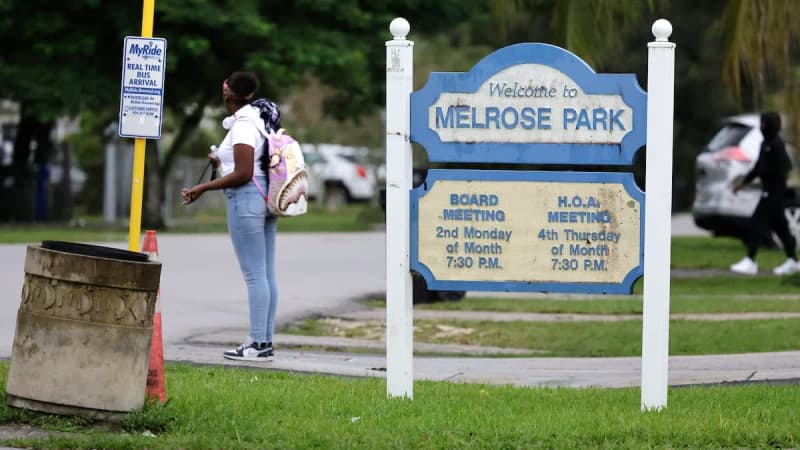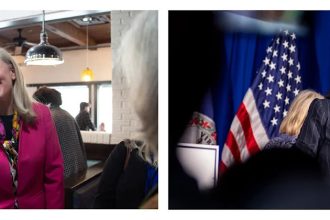When the sun goes down, darkness blankets Melrose Park, a predominantly Black neighborhood in central Fort Lauderdale that’s been without streetlights for decades.
Commissioner Pamela Beasley-Pittman says she wants to lift the neighborhood out of the shadows by installing more than 500 lights throughout Melrose Park at a cost approaching $1.3 million in the first year alone.
There’s just one problem: Some residents don’t want the lights — including Donna Guthrie, president of the Melrose Park Civic Association.
Fort Lauderdale is ready to spend $866,000 to have 555 LED lights installed throughout Melrose Park. City taxpayers also will pay another $431,300 a year to Florida Power & Light for monthly maintenance and other costs.
Guthrie argues there is no reason for Fort Lauderdale to spend so much money on lights the neighborhood does not want.
Guthrie spoke up at a City Hall meeting Oct. 7, telling commissioners the lights are not needed or wanted in what she called a quiet and peaceful neighborhood.
Residents who want the lights argued they will make the streets safer for children walking to the bus stop in the early morning darkness and drivers trying to find their way at night.
For now, the plan is on hold because the flood-prone neighborhood is so sharply divided.
Commissioners plan to take up the matter again at their next meeting on Oct. 23.
Melrose Park, home to 10,000 residents, is bounded by State Road 7 on the west and Southwest 31 Avenue on the east, by Davie Boulevard on the south and Broward Boulevard on the north.
“Those lights are going to cost nearly $500,000 a year in bills to Florida Power & Light,” Guthrie told the South Florida Sun Sentinel on Thursday. “That’s in perpetuity. And it’s going to go up every year.”
When it comes time for the commission to vote, Guthrie said she worries the lights will be forced on the neighborhood.
“Where the hell are we going to put 555 lights?” she said. “We don’t need 555 lights. People do not want it in front of their houses. Once the lights come, the street traffic is going to be horrific. They don’t come through now because it’s so dark.”
Guthrie, a community activist who hails from Jamaica, lost a four-way race to Beasley-Pittman in November 2022. The two have been rivals ever since.
The animosity came through loud and clear during the Oct. 7 public meeting.
Guthrie and Beasley-Pittman, the District 3 commissioner, openly clashed, arguing over who was to blame for the fact that the two had not met to discuss the pricey new lights despite the passage of three years.
The commissioner told Guthrie she had called her.
“No, you did not,” Guthrie replied.
“I knew you were going to say that,” the commissioner said. “You always say that. I am not a liar.”
Guthrie, her voice rising, retorted: “You did not call me.”
The back-and-forth squabbling prompted one observer to refer to the public scene as worthy of a new Bravo show, “The Real Housewives of District 3.”
The verbal sparring nudged Mayor Dean Trantalis into the role of TV host, mediating from the dais.
Vice Mayor John Herbst sided with Beasley-Pittman, arguing the commission should approve the new lights and follow the lead of the district commissioner.
Commissioners Steve Glassman and Ben Sorensen argued more time was needed to get input from the entire neighborhood, including Guthrie, who claimed she and the neighborhood association had been left out of the process.
The commission could have voted on the lighting program without public comment, but Beasley-Pittman said she pulled the item to give residents a chance to express their thoughts because so many people had mixed feelings about the plan.
Guthrie was the first to speak.
“This is the fourth time this lighting issue is on the agenda,” she said. “It was voted down twice before. And it was pulled by a previous commissioner.”
Guthrie argued the city had not done a recent survey of the neighborhood to determine whether the lights were warranted.
Instead, she said Beasley-Pittman held three meetings but chose to hold them at a community center in nearby Melrose Manors, not Melrose Park.
Guthrie also complained that neither Beasley-Pittman nor the city manager’s office had reached out to let her know the commission would be voting on the light program on Oct. 7.
As the president of the neighborhood association, Guthrie said she should have been given notice but was not — “which I think is rude,” she added.
Trantalis had a question for Guthrie.
When Fort Lauderdale proposed lighting for the neighborhood a decade ago, the city was ready to spend $11 million on more than twice as many lights, he noted.
He added: “The neighborhood was pushing back and saying, ‘We don’t want all this lighting here. We don’t want to feel like we’re a crime zone. We’re a quiet safe neighborhood.’”
Trantalis asked Guthrie if she was saying the neighborhood wanted no lighting at all.
“No lighting,” she answered. “You have to get the permission of the community. That wasn’t done. We don’t want you to pay this. We just don’t want it.”
Guthrie argued the lights would actually make the neighborhood less safe by attracting crime.
At that point, Beasley-Pittman interjected, arguing that the odd layout of the streets is what makes the neighborhood safe, not the lack of lighting.
“It makes it hard to for people to get in and out day or night,” she said. “That’s what’s helping keep the crime down because people won’t go over there.”
Carmen Palmer, a 31-year resident of Melrose Park, was among more than 20 people who signed up to speak.
“I have no crime on my street,” she told the commission. “Lights will harbor people hanging out in the streets. And in (a nearby neighborhood) where they have streetlights, there’s a lot of crime. So I vote no lights.”
Mary Lockhart, a longtime resident of the neighborhood, told commissioners she used to walk her kids to the bus stop early in the morning with a flashlight to make sure they arrived safely.
“We’ve been in Melrose Park for 40 years and we need to come to 2025,” Lockhart said. “It’s time for us to have the lights. Our families can’t come in and (visit) us because it’s too dark and they can’t find their way.”
After hearing from both sides, Glassman argued more time was needed to vet the lighting program with the community. The mayor and Sorensen agreed.
“I kept score,” Glassman said. “This is a very split room in terms of yes and no. We have work to do still. This is not ready for prime time yet. There’s just too much dissension.”
Glassman added: “I will tell you that if I ever had an agenda item that was affecting one of my neighborhoods and my neighborhood president was unaware of that agenda item, I would be run out of town. It’s as simple as that. We have to communicate better.”
Beasley-Pittman bristled at the feedback, arguing that Guthrie had been difficult to reach.
“This is what the community wants,” she said of the new lights.
The mayor intervened.
“There seems to be conflict on this,” he said. “I think ultimately we will see some sort of lighting system there. The question is how it’s going to be designed and where it’s going to be allocated. We have to come to some conclusion here, not necessarily tonight, to allow this project to go forward. I do think we should show deference to the neighborhood association to identify where the lighting system should be located.”
Beasley-Pittman stood her ground.
“This is what the people want,” she said, prompting Glassman to shake his head.
“You can shake your head,” she told Glassman. “What I’m asking for us to do is vote for these lights for this community. We’ve been talking about this for how long? Since 2015.”
Glassman’s reply: “I’m concerned that we heard a very split community this evening. I just believe the entire neighborhood has to be a part of this discussion. All I’m saying is we need more time. The process needs to be better.”
Sorensen intervened, trying his best to get Guthrie and Beasley-Pittman to meet with one another before the matter comes up again in two weeks.
Beasley-Pittman objected to him stepping in.
“Ben, I appreciate what you’re doing … but I have a problem with this approach,” she said. “I am a full commissioner. I am a full adult. And I am looking at a woman who looks just like me. And we should not have this divide.”
Beasley-Pittman addressed Guthrie directly.
“I didn’t do anything to you,” she said. “The only thing I did was I won this seat. Miss Donna, if there’s anything I did that offended you, I apologize to you. But what I want to do is move in a direction where Melrose Park can unify. Whatever it is, I’m sorry.
“Look at us, Miss Donna,” said Beasley-Pittman, the lone Black woman on the five-member board. “Black women in a culture where we are being erased. And you are sitting here playing into that role.”
Beasley-Pittman urged the mayor to “take a stand” and vote for the lights that night without further delay.
Trantalis told Pittman he was bothered by the fact that the head of the homeowners association had not yet met with the district commissioner to review details of where the lights would be placed.
“I don’t think there’s any fault on anyone’s side,” the mayor said. “It’s just that it didn’t happen. I would just like to see it happen before we make a decision.”









